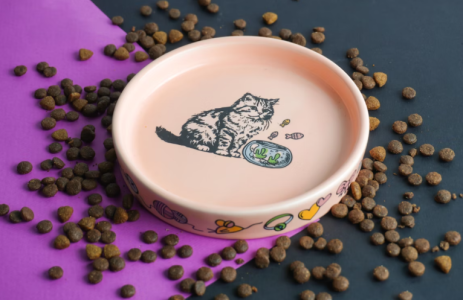The overlooked pet care habit that could make a big difference in health
- Replies 0
Pets bring joy, laughter, and comfort, but caring for them also comes with a set of responsibilities that go beyond feeding and walks.
One overlooked task is keeping their food and water bowls clean, which can have a direct impact on their health.
While many assume that pets, especially dogs, can handle a little grime, experts warn that bacteria build up quickly in neglected dishes. The solution is simple, but surprisingly few pet owners are doing it consistently.
According to pet care experts, food and water bowls should ideally be washed every day, or at the very least on a weekly basis.
Automatic feeders, while convenient, also need attention, and the hoppers that store dry food should be cleaned at least once a week.
Ignoring this routine can lead to dangerous bacteria growth, even if your dog happily scavenges scraps outside or your cat seems indifferent to cleanliness.
A clean bowl is a basic but crucial part of pet health, serving as the foundation for preventing germs and keeping daily meals safe.

The reason cleaning is so important is that leftover food particles and standing water create the perfect environment for bacteria to thrive.
While pets may not show immediate symptoms after eating from a dirty bowl, long-term exposure can increase the risk of stomach upset, infections, or worse.
This is particularly concerning for cats, who are already prone to dehydration and may rely heavily on their water dish.
Proper sanitation can make a bigger difference than most owners realize, often preventing issues before they even start.
Also read: Pet owners beware: Are your dogs secretly spreading deadly infections?
This advice fits into a larger conversation about overlooked aspects of pet care. Just as buckling pets into the car or managing a dog’s sleep schedule can prevent problems, washing their bowls is another layer of protection.
Pet owners are often willing to spend on toys, beds, and even insurance, but the most impactful step can be as small as consistent cleaning.
The simplest routines can often provide the strongest safeguards for long-term health, offering steady protection with very little effort.
Experts emphasize that cleaning bowls is not just about germs but also about creating a healthier home environment for pets and humans alike.
Also read: Could a new pill help your pet live longer—and maybe you, too?
Regular scrubbing with hot, soapy water or running bowls through the dishwasher keeps both the dishes and your pet safe.
It’s an easy routine that pays off in fewer health risks and happier pets, helping to create a healthier environment with very little extra effort.
Read next: Got this dog food at home? Urgent FDA recall requires you to stop feeding it to your pets immediately

So, how often do you actually wash your pet’s food and water bowls? Do you stick to a daily routine, or are you guilty of letting them sit for too long? Share your habits and thoughts in the comments—and maybe inspire other pet owners to rethink their own cleaning schedules.
One overlooked task is keeping their food and water bowls clean, which can have a direct impact on their health.
While many assume that pets, especially dogs, can handle a little grime, experts warn that bacteria build up quickly in neglected dishes. The solution is simple, but surprisingly few pet owners are doing it consistently.
According to pet care experts, food and water bowls should ideally be washed every day, or at the very least on a weekly basis.
Automatic feeders, while convenient, also need attention, and the hoppers that store dry food should be cleaned at least once a week.
Ignoring this routine can lead to dangerous bacteria growth, even if your dog happily scavenges scraps outside or your cat seems indifferent to cleanliness.
A clean bowl is a basic but crucial part of pet health, serving as the foundation for preventing germs and keeping daily meals safe.

The overlooked pet care habit that could make a big difference in health. Image source: Erfan Khoshbin / Unsplash
The reason cleaning is so important is that leftover food particles and standing water create the perfect environment for bacteria to thrive.
While pets may not show immediate symptoms after eating from a dirty bowl, long-term exposure can increase the risk of stomach upset, infections, or worse.
This is particularly concerning for cats, who are already prone to dehydration and may rely heavily on their water dish.
Proper sanitation can make a bigger difference than most owners realize, often preventing issues before they even start.
Also read: Pet owners beware: Are your dogs secretly spreading deadly infections?
This advice fits into a larger conversation about overlooked aspects of pet care. Just as buckling pets into the car or managing a dog’s sleep schedule can prevent problems, washing their bowls is another layer of protection.
Pet owners are often willing to spend on toys, beds, and even insurance, but the most impactful step can be as small as consistent cleaning.
The simplest routines can often provide the strongest safeguards for long-term health, offering steady protection with very little effort.
Experts emphasize that cleaning bowls is not just about germs but also about creating a healthier home environment for pets and humans alike.
Also read: Could a new pill help your pet live longer—and maybe you, too?
Regular scrubbing with hot, soapy water or running bowls through the dishwasher keeps both the dishes and your pet safe.
It’s an easy routine that pays off in fewer health risks and happier pets, helping to create a healthier environment with very little extra effort.
Read next: Got this dog food at home? Urgent FDA recall requires you to stop feeding it to your pets immediately
Key Takeaways
- Experts recommend cleaning pet food and water bowls daily, or at least weekly, to prevent bacterial growth.
- Automatic feeders also require weekly cleaning, including the food storage hopper, to avoid contamination.
- Dirty bowls can lead to health risks such as stomach upset, infections, and dehydration concerns, especially in cats.
- Regular cleaning with hot water and soap or a dishwasher cycle is one of the simplest and most effective ways to protect pets.






